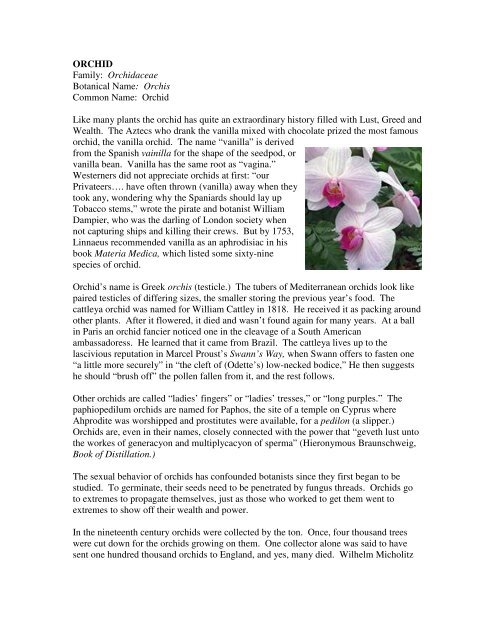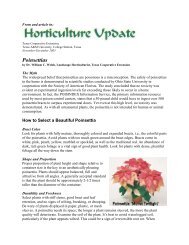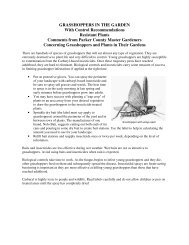ORCHID Family: Orchidaceae Botanical Name: Orchis Common ...
ORCHID Family: Orchidaceae Botanical Name: Orchis Common ...
ORCHID Family: Orchidaceae Botanical Name: Orchis Common ...
You also want an ePaper? Increase the reach of your titles
YUMPU automatically turns print PDFs into web optimized ePapers that Google loves.
<strong>ORCHID</strong><br />
<strong>Family</strong>: <strong>Orchidaceae</strong><br />
<strong>Botanical</strong> <strong>Name</strong>: <strong>Orchis</strong><br />
<strong>Common</strong> <strong>Name</strong>: Orchid<br />
Like many plants the orchid has quite an extraordinary history filled with Lust, Greed and<br />
Wealth. The Aztecs who drank the vanilla mixed with chocolate prized the most famous<br />
orchid, the vanilla orchid. The name “vanilla” is derived<br />
from the Spanish vainilla for the shape of the seedpod, or<br />
vanilla bean. Vanilla has the same root as “vagina.”<br />
Westerners did not appreciate orchids at first: “our<br />
Privateers…. have often thrown (vanilla) away when they<br />
took any, wondering why the Spaniards should lay up<br />
Tobacco stems,” wrote the pirate and botanist William<br />
Dampier, who was the darling of London society when<br />
not capturing ships and killing their crews. But by 1753,<br />
Linnaeus recommended vanilla as an aphrodisiac in his<br />
book Materia Medica, which listed some sixty-nine<br />
species of orchid.<br />
Orchid’s name is Greek orchis (testicle.) The tubers of Mediterranean orchids look like<br />
paired testicles of differing sizes, the smaller storing the previous year’s food. The<br />
cattleya orchid was named for William Cattley in 1818. He received it as packing around<br />
other plants. After it flowered, it died and wasn’t found again for many years. At a ball<br />
in Paris an orchid fancier noticed one in the cleavage of a South American<br />
ambassadoress. He learned that it came from Brazil. The cattleya lives up to the<br />
lascivious reputation in Marcel Proust’s Swann’s Way, when Swann offers to fasten one<br />
“a little more securely” in “the cleft of (Odette’s) low-necked bodice,” He then suggests<br />
he should “brush off” the pollen fallen from it, and the rest follows.<br />
Other orchids are called “ladies’ fingers” or “ladies’ tresses,” or “long purples.” The<br />
paphiopedilum orchids are named for Paphos, the site of a temple on Cyprus where<br />
Ahprodite was worshipped and prostitutes were available, for a pedilon (a slipper.)<br />
Orchids are, even in their names, closely connected with the power that “geveth lust unto<br />
the workes of generacyon and multiplycacyon of sperma” (Hieronymous Braunschweig,<br />
Book of Distillation.)<br />
The sexual behavior of orchids has confounded botanists since they first began to be<br />
studied. To germinate, their seeds need to be penetrated by fungus threads. Orchids go<br />
to extremes to propagate themselves, just as those who worked to get them went to<br />
extremes to show off their wealth and power.<br />
In the nineteenth century orchids were collected by the ton. Once, four thousand trees<br />
were cut down for the orchids growing on them. One collector alone was said to have<br />
sent one hundred thousand orchids to England, and yes, many died. Wilhelm Micholitz
sent home an orchid growing in a<br />
human skull, which was auctioned<br />
for a huge sum complete with<br />
container.<br />
Orchid hunters mostly searched<br />
for riches rather then knowledge<br />
of the amazing plant world.<br />
Nobody seemed to care that huge<br />
areas were stripped of native<br />
orchids, and we cannot feel sorry<br />
for their collectors who met with<br />
trouble. Even now, orchids are<br />
more often corsages for the rich<br />
than comfort for those who live in poor places and could enjoy their beauty in the native<br />
habitat. Their beauty, although undeniable, is not the beauty of simplicity.<br />
100 Flowers and How They Got Their <strong>Name</strong>s<br />
by: Diana Wells










